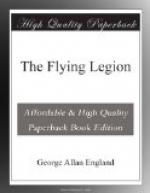“Faith, are we going to make it, chief?” asked the major, impatiently. Not his the temperament that can wait in silence. He made a singular figure as he lounged there at the pilot-house window, huge elbows on the sill. One hand was wrapped in bandages, well saturated with croton-oil. Chars and burns on his uniform showed where blazing petrol from the final explosion had spattered him.
His eyes, like the Master’s, were bloodshot, inflamed. Part of his red crop of hair had been singed off, and all his eyelashes were gone, as well as half his bushy red brows. But the ugly set of his jaw, the savage gleam of his eyes showed that no physical pain was depressing him. His only trouble was the thought that perhaps the expedition of the Flying Legion had ended before it had really begun.
“What chance, sir?” he insisted. “It’s damned bad, according to my way of thinking.”
“What you think and what you say won’t have any weight with this problem of aerial flotation,” the Master curtly retorted. “If we make land, we make it, that’s all, sir.” He relapsed into silence. Leclair muttered, in Arabic—his words audible only to himself—an ancient Islamic proverb: “Allah knows best, and time will show!” Then, after a moment’s pause, the single word: “Kismet!”
Silence again, in which the Master’s brain reviewed the stirring incidents of the past hour and a half—how the stowaway had evaded Dr. Lombardo’s vigilance and (thoroughly familiar with every detail of Nissr) had succeeded in making his way to the aft port fuel-tank, from which he had probably drained petrol through a pet-cock and thereafter set it afire; how the miscreant had then scrambled up the aft companion-ladder, to shoot down the Master himself; and how only a horrible, nightmare fight against the flames had saved even this shattered wreck of the air-liner.
It had all been Kloof’s fault, of course, and Lombardo’s. Those two had permitted this disaster to befall, and—yes, they should be punished, later. But how? The Master’s mind attacked this problem. Each of the four Legionaries in the pilot-house was busy with his own thoughts.
On and on toward the approaching shores of Africa drifted the wounded Eagle of the Sky, making no headway save such as the west wind gave her. Steadily the needle of the altimeter kept falling. The high-pitched drone of the helicopters told that the crippled engines were doing their best; but even that best was not quite enough.
Like a tired creature of the air, the liner lagged, she sank. Before half the distance had been covered to that gleaming beach, hardly six hundred feet lay between the lower gallery of Nissr and the long, white-toothed waves that, slavering, hungered for her gigantic body and the despairing crew she bore.
Suddenly the Master spoke into the engine-room telephone.
“Can you do any better?” exclaimed the chief. “This is not enough!”




